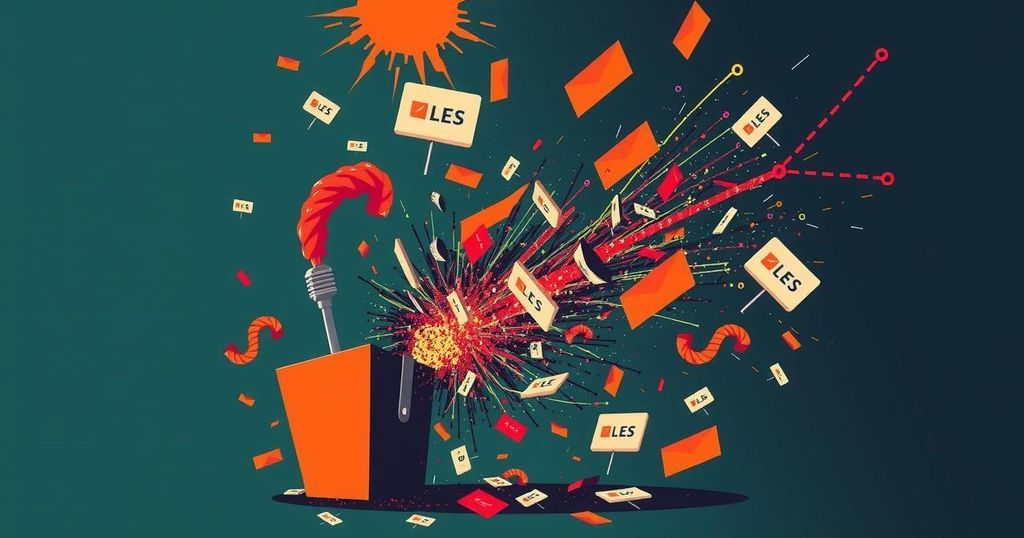The Rising Chaos of Election Disinformation
Disinformation surrounding elections is escalating, driven by legal challenges, diminishing social media moderation, and foreign influences. High-profile individuals’ amplification of conspiracy theories further complicates the situation, posing real risks to electoral integrity and public trust. As Election Day approaches, vigilance and verification of information are crucial to combat this chaotic landscape.
The presence of disinformation surrounding elections has reached a level of chaos, exacerbated by recent political developments and technological advancements. Following Hurricanes Helene and Milton, high-profile individuals such as Donald Trump, Elon Musk, and Marjorie Taylor Greene disseminated alarming misinformation regarding the storms, providing a glimpse into what may transpire as Election Day approaches. Elaine Godfrey, who covers political affairs, asserts that the current environment is exceptionally conducive to the spread of conspiracy theories. Several factors contribute to this phenomenon. Since the 2020 elections, notable conservative politicians have launched legal challenges against institutions attempting to curb disinformation. Organizations like the Stanford Internet Observatory have faced severe legal actions, deterring them from actively combatting false information. Additionally, the emergence of groups such as the Election Integrity Network fosters distrust in the electoral process by promoting baseless conspiracy theories. The decline in content moderation by social media platforms like X and Meta has further exacerbated the situation, allowing misinformation to proliferate unchecked. Godfrey highlights the growing influence of foreign actors amid global tensions, presenting new motivations for interference in American politics. The advent of advanced AI tools has created a more fertile terrain for the rapid dissemination of disinformation. As Election Day looms, the nature of conspiracy theories is expected to evolve. Recent weeks have seen a range of unfounded accusations, including claims from Marjorie Taylor Greene suggesting Democratic involvement in manipulating hurricanes for political advantage. Furthermore, individuals with extensive social media followings are spreading unverifiable claims of receiving significant insider information, diluting accountability and fact-checking processes. The impact of disinformation extends beyond the digital realm, posing real-world implications. FEMA officials have reported threats due to false information about their operations, which has hindered their ability to conduct community outreach effectively. As for electoral misinformation, it sows doubt about the integrity of the voting process, with many citizens believing that their rights may be infringed upon. Furthermore, figures like Elon Musk have exacerbated the issue by amplifying misleading statements on social media, influencing public perception and potentially swaying electoral outcomes. Godfrey notes that the current landscape could lead to escalated levels of misinformation, especially as tensions rise. In summary, while society is better equipped to respond to electoral misinformation than in previous years, enormous challenges remain. Understanding and confronting disinformation is paramount as it tends to incite fear and manipulate public opinion. Citizens are urged to critically assess emotional or sensational claims circulating on social media, seeking verification rather than succumbing to sensational narratives.
Election disinformation has become a critical issue, particularly as elections approach. The recent surge in conspiracy theories can be traced to multiple factors, including diminishing oversight from social media companies, legal threats directed at organizations combating misinformation, and the rise of foreign interference amid escalating global tensions. These factors create an environment where disinformation thrives, impacting public opinion and electoral integrity. The article discusses the implications of these developments and highlights the urgency with which society must address these ongoing concerns.
The environment surrounding election disinformation is increasingly precarious, fueled by legal challenges, diminished moderation on social media, and the proliferation of conspiracy theories. As Elections Day approaches, it is critical for citizens to remain vigilant, verifying information and resisting emotional manipulations that could lead to misinformed beliefs regarding electoral integrity. A collective commitment to truth and accountability is essential to safeguarding democracy.
Original Source: www.theatlantic.com




Post Comment